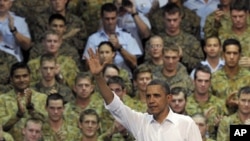In a speech to Australia's Parliament on Thursday, U.S. President Barack Obama hailed the strength of the U.S. alliance with Australia, saying a new military cooperation agreement will help the United States play a larger security role in the Asia-Pacific. President Obama also addressed Australian and U.S. troops in the northern city, Darwin.
After his speech in Canberra - in which he said the U.S. and Australia have always stood together as allies and continue to do so today in places like Afghanistan - the president flew to Darwin in Australia's Northern Territory.
Darwin was heavily bombed by Japanese forces during World War II. After laying a wreathe at a memorial to the crew of the USS Peary, a U.S. ship sunk in Darwin in 1942, he appeared with Prime Minister Julia Gillard in an aircraft hangar filled with about 1,600 cheering Australian soldiers and 55 U.S. Marines.
Obama says the agreement for enhanced U.S. access to Australian bases will help ensure security in the broader Pacific region.
"Here in Darwin and northern Australia, we will write the next proud chapter in our alliance," he said. "As the prime minister and I announced yesterday, some of our Marines will begin rotating through these parts to train and exercise with you and to work as partners across the region for the security we all want."
Under the new agreement, an initial group of 250 U.S. Marines will deploy and rotate in and out of bases in northern Australia, eventually expanding to a 2,500-strong Marine Air Ground Task Force, although the exact time line for this is uncertain. There will also be a significant increase in the number of airfields used by U.S. military aircraft.
U.S. Marine Brigadier General Ronald Baczkowski called the enhanced U.S. Marine deployments consistent with a "geographically distributed, operationally resilient force posture in the Pacific" and include combined arms training with Australian allies.
Speaking in Canberra earlier, Obama said tough budget decisions the United States must make to repair its fiscal situation, including cuts in defense spending, will not diminish the commitment to the Pacific.
"As we plan and budget for the future, we will allocate the resources necessary to maintain our strong military presence in this region," Obama said. "We will preserve our unique ability to project power and deter threats to peace. We will keep our commitments, including our treaty obligations to allies like Australia."
Upgrading of the 60 year Australian-American alliance is seen in this region as a clear message from Washington to Beijing, amid concerns about possible conflict over the South China Sea.
White House Deputy National Security Adviser for Strategic Communications Ben Rhodes called the U.S.-Australian agreement "perfectly appropriate" and supported by other nations in the region.
"There is a demand signal from the nations of the region, and this is something that we're doing in concert with one of our closest allies," he said. "So we believe it's not just entirely appropriate, but an important step to dealing with the challenges of the future of the Asia Pacific region.
Rhodes said a "rising China" was one part of the context of Obama's remarks about the future of the region. Asked if the U.S.-Australia agreement might lead to a permanent U.S. presence, he described it only as a "sustained" ongoing deployment.
Obama carries what can be seen as momentum from the U.S.-Australia announcement into discussions on security issues with leaders at the East Asia Summit in Bali.
He will have bilateral talks with leaders from treaty partners Thailand and the Philippines, along with host Indonesia, all the while reaffirming the messages he has sent so far on this trip about the U.S. commitment to stability.
He will also meet with Indian Prime Minister Manmohan Singh. In his speech in Canberra, he welcomed India's "look East" policy and New Delhi's efforts to play a larger role as an Asian power.
Obama Takes Momentum from Australia into East Asia Summit




